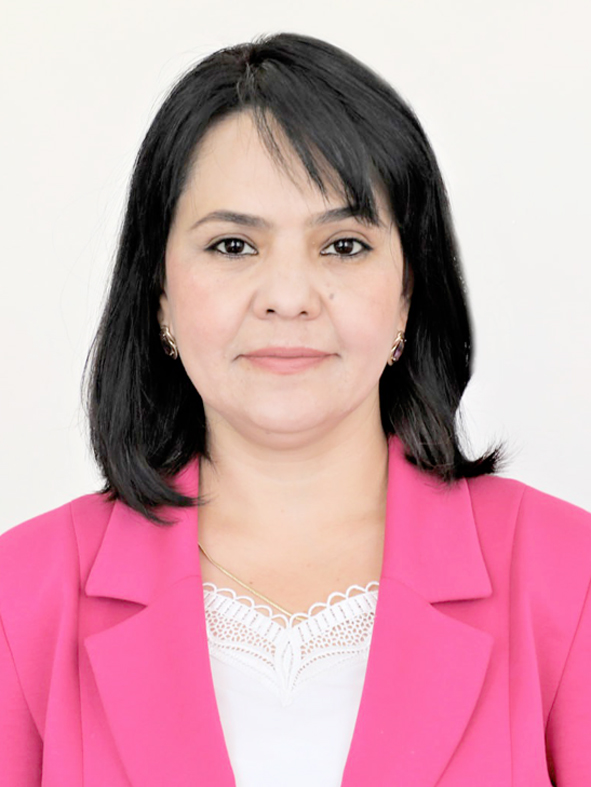NORMAMATOVA MAKHSUDA NURMAMATOVNA
Normamatova Makhsuda Nurmamatovna
Associate Professor | Doctor of Philosophy (DSc), Associate Professor

Social work practice with families and children, sociological research practice, social work with persons with disabilities, Acmeology, social work practice, Social policy, social service
Qualification certificate of the Academy of Public Administration in the presence of the President of the Republic of Uzbekistan (2024.05.03)
1999-2003 - Student at Samarkand State University
2001-2004 - Teacher of school No. 3 of Samarkand district
2004-2005 - History teacher at Samarkand City Vocational College of Consumer Services
2005-2007 - Master's student at Samarkand State University
2005-2009 - Teacher of school No. 2 of Samarkand district
2009-2011 - Senior laboratory assistant at the Department of Eastern Philosophy and Spirituality, Samarkand State University
2011-2013 - Research intern at Samarkand State University
2013-2014 - Senior Researcher at Samarkand State University
2014-2015 - Assistant, Department of Theory and Practice of Building a Democratic Society, Samarkand State University
2015-2017 - Assistant at the Department of Social Work, Samarkand State University
2017-2018 - Assistant at the Department of Social Sciences, Samarkand State University
2018-2019 - Doctor of Philosophy (PhD), senior lecturer at the Department of Social Sciences, Samarkand State University
2019-2023 - Associate Professor of the Department of Social Sciences, Samarkand State University
2023 - present - Associate Professor, Department of Sociology and Social Work, Samarkand State University named after Sh. Rashidov, Doctor of Philosophy (DSc)
In our country today, the virtualization of the system of providing practical assistance to various segments of the population, taking into account age, gender, social status, and physical potential, is becoming one of the main priorities of state policy. “To lay the foundation of the third Renaissance in our country, we need modern science, and again science, and upbringing, and again education. We need highly qualified teachers and mentors, professors, real intellectuals who will decide the fate of our today and tomorrow, our youth.” . To this end, there is an increasing need for research on the organization of new mechanisms of the social service system and the formation of modern social services in our country based on the proven experience of developed countries. Based on this, a theoretical and methodological analysis of the patterns of virtualization of promising social services becomes an objective necessity.
Scientific innovation consists of:
the content and functions of digitization (digitalization of the economy, business, finance, industry, healthcare, education, information systems) are scientifically substantiated;
virtual ways have been identified to ensure the quality of virtual social services, receive social assistance to needy categories of the population (social networks, e-government, television;
the methodological foundations of virtualization of new pedagogical technologies and innovations introduced into the social service system are argued;
on the basis of socio-economic, cultural and educational changes occurring in society, the philosophical aspects of activities to provide assistance to persons with disabilities, work with unorganized youth, and promote employment through the field of social services are revealed;
in conditions of socio-political upsurge, recommendations for the use of virtual media to strengthen patriotic and humane feelings, the historical consciousness of youth, as well as defining (descriptive) rules that reveal the content of such virtualistic concepts as a virtual museum, virtual historical images, virtual emblems have been logically proven virtual great personalities, virtual tourism, virtual travel.
The scientific significance lies in the fact that the theoretical and methodological conclusions, proposals and recommendations put forward in it are used within the framework of such disciplines as “Philosophy of Education”, “Philosophy of Technology”, “Philosophy and Methodology of Science”, “Dialectics and Theory of Knowledge”, “ Methodology of scientific research", "Philosophy of science", "Ontology and theory of knowledge".
The practical significance of the research results is determined by the fact that the approaches proposed in it can be used in the development of normative and legal acts of reforms carried out for the development of civil society, in the higher education system, in the activities of museums, libraries, civil society institutions, the Center for the Development of Electronic Government, IT parks and media.
"1.Theoretical and Methodological Foundations of Virtualization of Social Services. Authorized licensed use limited to: National Institute of Technology Patna. Downloaded on August 10,2023 at 04:21:01 UTC from IEEE Xplore. Restrictions appl. 2023 International Conference on Advances in Computing, Communication and Applied Informatics (ACCAI) 979-8-3503-1590-5/23/$31.00 ©2023 IEEE DOI: 10. 1109/ ACCAI58221.2023.1020086.
2. Virtual science is a new scientific paradigm. 2023 IEEE Renewable Energy and Sustainable E-Mobility Conference (RESEM) 979-8-3503-1132-7/23/$31.00 c2023 IEEE/DOI:10.1109/RESEM57584.2023.10236372.
3. Ижтимоий хизматни виртуаллаштиришнинг назарий моделлари ва амалий технологиялари. Фалсафа ва ҳаёт. 2023 йил, 119-126 б.
4. Ижтимоий хизматларни виртуаллаштиришнинг амалий жиҳатлари. Таълим тизимида ижтимоий-гуманитар фанлар. Тошкент-2023й. 6-13 б.
5. Ижтимоий хизмат кўрсатишнинг замонавий коммуникатив усуллари. Jornal of universal sciense research. Халқаро илмий журналнинг 2024 йил 4-сон. 168-171 б."

